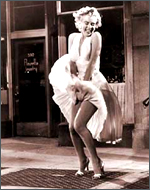

|
Piano Concerto No. 2 in C Minor
Tuesday, May 27, 2008 | Music
"Every time I hear it I go to pieces!"
Thus exclaims a breathless Marilyn Monroe in the movie, The Seven Year Itch. As the character Candy Kane, she is listening to Sergei Rachmaninoff's Piano Concerto No. 2 in C Minor, one of the most sensuous and romantic pieces of music ever written.
It owes its existence to hypnosis.
Even if you're not inclined towards classical music, you'd probably recognize some of the tunes from this beautiful piano concerto. Three best-selling pop singles were created out of its lush melodies: "Full Moon and Empty Arms" was popularized by crooners Frank Sinatra and Perry Como, "I Will Bring You Music" was a later adaptation, and in 1976 Eric Carmen extracted yet a third song to hit the pop charts, entitling it "All By Myself (Don't wanna be all by myself)."
Other stars besides Monroe have had their onscreen passions ignited and highlighted by the surging melodies of Rachmaninoff's Second Piano Concerto. This list of lovers includes Greta Garbo, John Barrymore, Elizabeth Taylor, Christopher Reeves and Jane Seymour in such films as Grand Hotel, Brief Encounter, I've Always Loved You, Rhapsody, September Affair, The Seven-Year Itch and Somewhere in Time.
The Second Piano Concerto is not the only popular piece written by Rachmaninoff. Many movies, including Groundhog Day and Shine, have featured other of his compositions. In fact, some of the highest ranked 20th-century film and Broadway composers admitted openly that they mimicked Rachmaninoff's style and borrowed liberally from his melodic patterns.
We have hypnosis to thank.
Sergei Rachmaninoff (1873-1943) was born in Russia. He fled the Communist regime in 1917, and spent the final two decades of his life in the United States, where he lived in New York City and Beverly Hills. But our story begins when Rachmaninoff was only 24 years old.
The young composer, who had studied with Tchaikovsky, had already received some small success by the time his First Symphony was scheduled for its premiere in St. Petersburg. That premiere was, in Hollywood terms, a flop! The conductor was reputed to have been drunk, and the performance was such an abysmal failure that the agonized composer rushed out of the orchestra hall before the symphony finished, and cringed in shame during the reception that followed.
"It is true that the performance was beneath contempt," he later wrote, "...but apart from this, its deficiencies were revealed to me with a dreadful distinctness even during the first rehearsal."
The critics were vicious. One well respected critic scathingly remarked in the newspapers the next day that Rachmaninoff would surely win first place for his symphony "if there were a conservatory in hell."
Rachmaninoff struggled unsuccessfully to continue composing, and finally stopped trying altogether. The young man sank into a deep depression which lasted for three years.
"Something within me snapped," he said. "All my self-confidence broke down.... A paralyzing apathy possessed me. I did nothing at all and found no pleasure in anything. Half my days were spent on a couch sighing over my ruined life. My only occupation consisted in giving a few piano lessons in order to keep myself alive."
The composer's depression was further compounded when he visited Leo Tolstoy, and played some of his compositions on the piano for the great Russian writer. Tolstoy, (who later apologized for his rudeness), said to Rachmaninoff, "Tell me, is such music needed by anybody?...I must tell you how I dislike it all!" The young man was devastated.
During these dark years, Rachmaninoff was living with some of his cousins. Worried about his health, they finally urged him to visit a psychiatrist in Moscow, a certain Dr. Nicolai Dahl, who happened to be a pioneer in the field of hypnosis. Dr. Dahl was gaining a reputation for successfully curing people through autosuggestion, and had devoted his career to this work. Coincidentally, he was also an excellent amateur musician, a string player.
Rachmaninoff, desperate to try anything, agreed to consult with Dr. Dahl. His sessions were frequent, and lasted over a period of four months.
Rachmaninoff, in his Recollections, described the scenario:
"My relatives had informed Dr. Dahl that he must by all means cure me of my apathetic condition and bring about such results that I would again be able to compose.
"Dr. Dahl had inquired what kind of composition was required of me, and he was informed, 'a concerto for pianoforte,' for I had promised this to people in London and had given up in despair the idea of writing it.
"In consequence, I heard repeated day after day the same hypnotic formula, as I lay half asleep in an armchair in Dr. Dahl's study: 'You will start to compose a concerto - You will work with the greatest of ease - The composition will be of excellent quality.' It was always the same, without interruption.
"Although it may sound impossible to believe, this treatment really helped me. I began to compose at the beginning of the summer. The material grew in volume, and new musical ideas began to well up within me, many more than I needed for my concerto....
"I felt that Dr. Dahl's treatment had strengthened my nervous system to a degree almost miraculous. Out of gratitude I dedicated my Second Concerto to him."
Although it has been 100 years since Rachmaninoff composed his Second Piano Concerto, its lyrical magic has survived the hackings of the record industry and the melodramatic applications of Hollywood. Today, thanks to hypnosis, it remains one of the most exquisite and deeply moving pieces of music ever written.
presented for it's greatness,
a piece by Mary Elizabeth Raines

|


|

